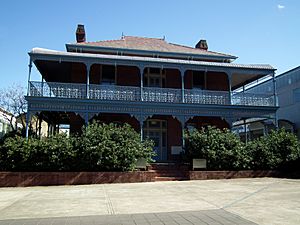Murphy House, Parramatta facts for kids
Quick facts for kids Murphy House |
|
|---|---|
 |
|
| Location | 1 Marist Place, Parramatta, City of Parramatta, New South Wales, Australia |
| Built | 1904– |
| Architect | James Whitmore Hill |
| Owner | Trustees of the Roman Catholic Church |
| Official name: Murphys House; St Patricks Cathedral Presbytery; Murphy House | |
| Type | state heritage (complex / group) |
| Designated | 2 April 1999 |
| Reference no. | 238 |
| Type | Churchyard |
| Category | Religion |
| Builders | A.E. Gould |
| Lua error in Module:Location_map at line 420: attempt to index field 'wikibase' (a nil value). | |
Murphy House is a special old building in Parramatta, New South Wales, Australia. It used to be a home for priests. This historic house is located at 1 Marist Place.
A famous architect named James Whitmore Hill designed Murphy House. It was built starting in 1904 by A. E. Gould. People also know this building as St Patrick's Cathedral Presbytery or Murphy's House. It is listed on the New South Wales State Heritage Register because it is an important part of history.
Contents
The Story of Murphy House
Murphy House was built in 1904. It was made to be the home for the priests of St Patrick's Cathedral. The house officially opened on November 27, 1904. Building it cost about £1000, which was a lot of money back then!
Why a New House Was Needed
Before Murphy House, the priests lived in an older building. This old home was not in good condition. It was even thought to be unhealthy. Sadly, the parish priest, Father P. B. Murphy, became very ill while living there.
The new house was built to replace that old, unhealthy building. It was a much better and safer place for the priests to live.
Honoring Father Murphy
The new presbytery was named in honor of Father P. B. Murphy. This is why it became known as Murphy House. It was a way to remember him and his service.
Today, Murphy House is still used for church activities. It continues to be an important part of the local community.
Protecting Our Heritage
Murphy House is a very important historical site. It was officially added to the New South Wales State Heritage Register on April 2, 1999. This listing helps protect the building. It makes sure that this special part of history is kept safe for future generations to see and learn from.
 | Percy Lavon Julian |
 | Katherine Johnson |
 | George Washington Carver |
 | Annie Easley |

